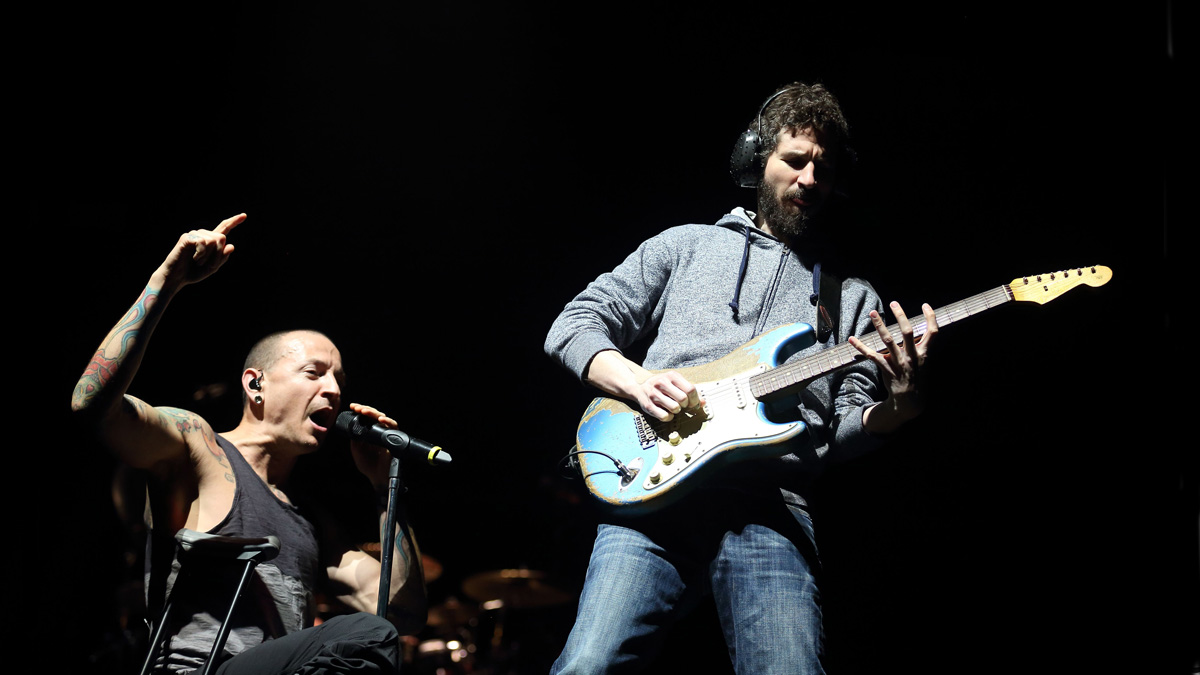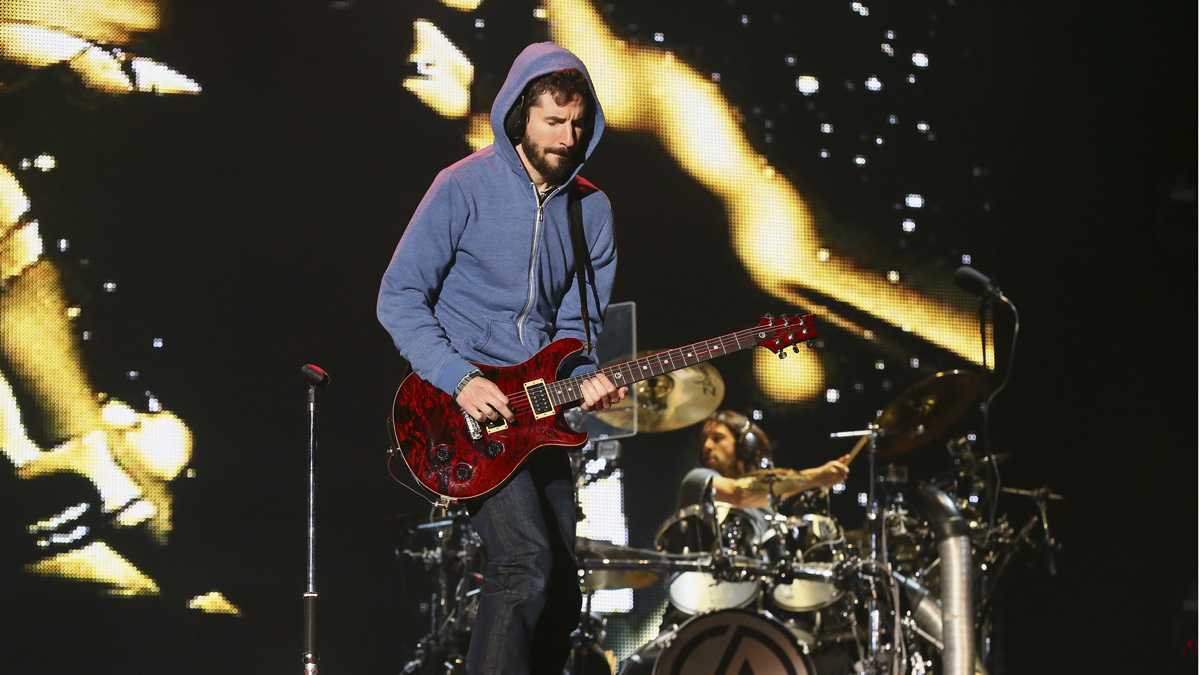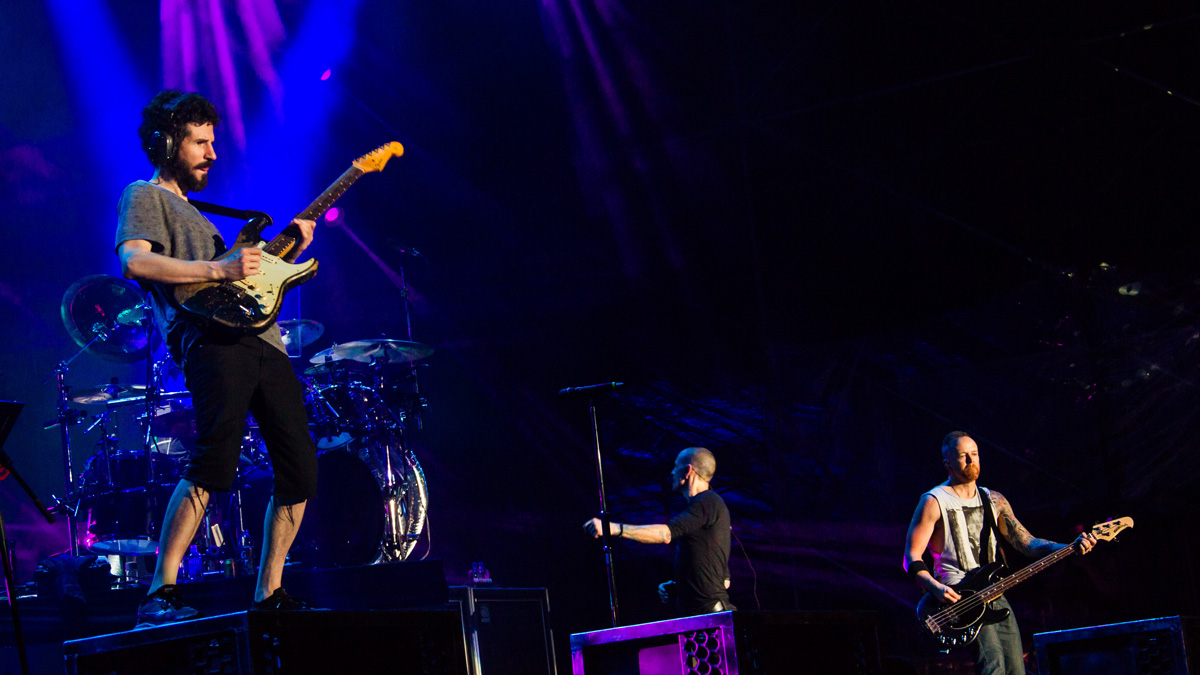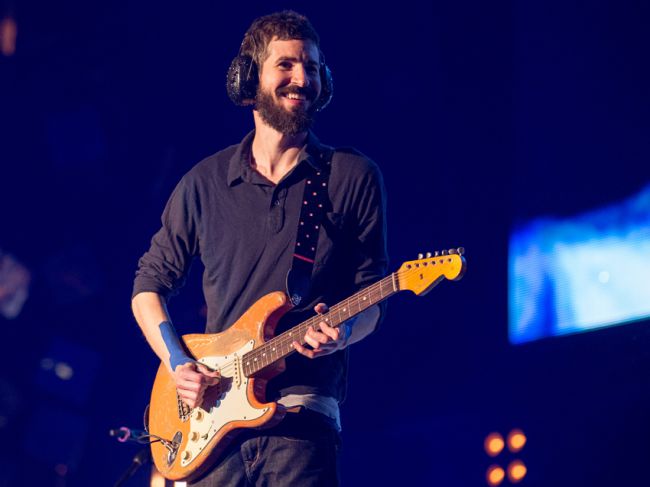Linkin Park’s Brad Delson talks One More Light: "There really is a ton of guitar on this album"
Guitarist shares all on the band’s "upside-down" seventh record

Hybrid theories
“Any long-time fan of this band knows that we tend to make violent course changes from album to album,” Linkin Park guitarist Brad Delson says as we discuss the band’s new record, One More Light.
He’s not kidding. Since the release of their monumentally successful debut, Hybrid Theory, 17 years ago, the band has lurched from rap metal to straight up rock to electronica and back again.
With more than 70 million records sold and two Grammys on their mantle, it would appear that their eclecticism has been rewarded.
So, for album seven did they decide to stick or twist?
“The change between the last album and this one is no exception,” Brad assures MusicRadar. “That’s fun for us as musicians.”
Judging from lead single Heavy, Delson is once again right on the money. The song's stripped-back pop is in stark contrast to the raw, rough-and-ready rock of 2014’s The Hunting Party.
Ahead of the album’s 19 May release, we spoke to the guitarist all about One More Light, the influence of Rick Rubin and confounding fan expectations at every turn.
You’re seven albums in now; how does the studio-seasoned 2017 Linkin Park approach making a new record?
“This was a really fun album to create. We created it in a way that was totally upside-down. We had this idea; we wanted to write songs. That might sound ridiculous, because everything we write are songs, but I really mean songs.
“We’ve made a lot of music throughout our career where the music takes the steering wheel. In that case, the sounds lead us through the journey. On this album we wanted to write songs that had something to say.
“Another idea we had was to be totally open in terms of our style of working and everything from guest artists to co-producers to co-composers. Anyone interesting that we wanted to meet, we wanted to give an open invitation to coming through, and in that regard it was a very fun record to make.”
We had a finished song that we loved and then we had to figure out what style it is. Is it a heavy rock song, is it minimalist, is it country, is it electronic-driven, or is it all of the above?
Judging by Heavy, this is a very different sounding record to The Hunting Party…
“The Hunting Party was driven by a ferocity and a desire to make a stylistic statement. It was definitely intended to be aggressive and really instrument-driven in terms of guitar and drums.
“On One More Light, we wrote all of the songs before they had any notion of style or context. We would go into the studio and really ask each other what was on our minds and what was in our hearts, what did we have to say and what did we want to express. It almost always started from conversations about things going on in our lives that were very personal.
"We worked with vocals, lyrics and melodies first. We almost completed a full song every single day. We wrote about 70 songs and they were all very naked and stripped, barebones.
“We normally have a lot of music cooked up and then work on vocals later. This was the opposite challenge. We had a finished song that we loved and then we had to figure out what style it is. Is it a heavy rock song, is it minimalist, is it country, is it electronic-driven, or is it all of the above? I think my favourite results were when you couldn’t quite tell what style it was; it was just a hybrid of all of the styles that we loved.”

"I wound up putting a lot of guitar on this album..."
Does a record like One More Light offer you a very different challenge to The Hunting Party? The Hunting Party had guitars right upfront; is it more a case of finding pockets of space for guitar on this album?
“I wound up putting a lot of guitar on this album. There’s a lot of layers and a lot of different guitars. The guitar work is nuanced and complementary to all of the other elements that we have put in there.
“I find guitar to be a dominant ingredient in any soup. The minute I put loud heavy guitars into an arrangement, I feel like it is a heavy colour. One of the goals of the production of this album was to do away with any notion of genre. We were looking at ways to juxtapose influences that we have in ways that you haven’t heard before. Building the guitar work into that was a fun challenge.
“I love the guitar work and tones that our engineer Ethan helped create with me and Mike [Shinoda] throughout this album. Even though you don’t hear guitar in the foreground in a heavy-handed way, there really is a ton of guitar on this album, and I’m really proud of it.”
Do you enjoy challenging fan expectations by changing up the style from album to album? Do you worry that some fans will feel alienated and won’t go with you in a new direction?
“When we met Rick Rubin while working on our third album, one of the first things he asked us was what were we listening to. It was a serious question and we each went around and said what we were listening to. He was making the point that we are a band and artists, and we need to make whatever music we feel at that point most inspired to make.
“I gleaned his point to mean that a lot of artists that have commercial success can feel trapped to recreate something for someone else’s expectations. Then there are artists that constantly reinvent themselves and have that courage. Rick Rubin liberated us in that way. We thought people might expect a, b or c from us, but what did we expect for ourselves?”
Even though you don’t hear guitar in the foreground in a heavy-handed way, there really is a ton of guitar on this album
Some fans some that the lead single was called Heavy and expected a big, heavy song…
“I understand it, for sure. It’s almost shocking how surprising [Heavy] is. From our perspective it is very different. We started writing these songs in November 2015 and worked on these songs every day from then until February 2017. We have been living with them.
“Wherever we go with our music it is always very familiar to the band but very surprising to people hearing it for the first time. I’m excited for our fans to hear the whole album.”
You co-produced this record, so having lived with these songs for so long, did the process become all-encompassing for you?
“It is totally immersive. I would go to the studio for sometimes 10-12 hours a day every day. When we first started making music as a band, we did it because we love to make music and also because there was something specific that we weren’t hearing anyone else do, and we wanted to do it selfishly because we wanted to listen to it. That’s still the reason why we do what we do.
“Even when I drive home from the studio I am listening to these songs in the car because I want to hear this music.”

Trial and error
Did the change of musical approach for this album mean big changes on the gear front?
“I had some vintage gear, some Fender Custom Shop and reissues of vintage Strats that I go to a lot. We used some old Teles... there's a Jazzmaster I used a lot on this album.
“Our engineer Ethan goes through the painstaking process of collecting really cool gear, and then if I really love it I will take it from him! I have the best Strat that he owned and he very generously traded it with me.
“He’s got this acoustic guitar that is amazing. I don’t even know the make of it or anything, but it is my favourite guitar. I did all my songwriting with that guitar.
“We had [songwriter/producer] Eg White out with us for a week and he worked with us and fell in love with that acoustic guitar. He went on Craigslist and found this same make of guitar. He drove to some dodgy part of town to get this guitar and was so excited. He brought it over to us only to find out that it sounded absolutely nothing like Ethan’s guitar that we had been playing!
“He went through some insane trial and error process to try and replicate the situation; I think at one point he rubbed pumpkin on the strings but it all totally went awry. That just goes to show how special this guitar is.
“In terms of the sound, we created a bespoke tone for every song. It was an exciting process of trial and error for us to get tones.”
Are there any points where you think the change in musical tact particularly complements your guitar work?
“I love the acoustic work on Sharp Edges. I really like all of the layering of guitars on Invisible as well. There’s also a really unique presentation of the guitar in a way that I don’t think we’ve ever done on a song called Sorry For Now. That was one of the things that we were really excited about - it is wildly different to anything else that we have been doing.”
Rich is a teacher, one time Rhythm staff writer and experienced freelance journalist who has interviewed countless revered musicians, engineers, producers and stars for the our world-leading music making portfolio, including such titles as Rhythm, Total Guitar, Guitarist, Guitar World, and MusicRadar. His victims include such luminaries as Ice T, Mark Guilani and Jamie Oliver (the drumming one).

